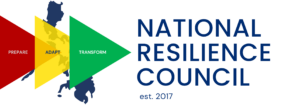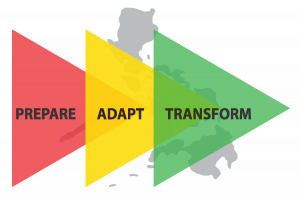
In April 2020, the National Resilience Council (NRC), in partnership with ARISE Philippines, Zuellig Family Foundation, and the Makati Business Club, launched its 4-part COVID-19 Knowledge Series: Expert Dialogue on Resilience, Public Health, and Human Security. This series aims to provide a platform for informed multi-stakeholder dialogue; bridge global knowledge and expertise with local practice; and catalyze evidence-informed decisions and actions by bringing together representatives from the national and local government, the health sector, the private sector, and experts in leadership and governance.
The first webinar on the theme “Pandemic Frontliners: Health Emergency Practice and Crisis Leadership” was held on April 3, and established the need to have a unified course of action for the COVID-19 pandemic through an understanding of the interdependence between socially-engineered systems and natural systems. It highlighted the importance of resilient leadership and governance in building systems and a network of decisions that will actually lead to everyone’s desired impact. In a series of presentations, experts explored the ramifications of COVID-19 in the way we govern, the way we run businesses, and the way society will adapt in the aftermath of disaster-related trauma. Three critical management functions surfaced at the end of the session: management of innovation, management of logistics, and management of the socio-economic consequences of the pandemic. The overall takeaways from the session include the importance of command structure and key task groups, stronger national and local government collaboration, stronger public-private collaboration, and improved communication and collaboration with all stakeholders.
The second webinar on the theme “Pandemic Public Safety and Security” was held on April 17 to address the rapid evolution of the traditional and non-traditional roles of the safety and security sector in decreasing exposure and vulnerability to this biological hazard. COVID-19 has triggered cascading impacts across interdependent systems and has disrupted the operation of critical infrastructure. When compounded, these impacts may threaten social and economic stability and a nation’s resilience and security. This complexity has imbued the roles of the safety and security sector with even greater nuance and importance. The second session of the COVID-19 Knowledge Series highlighted the ways by which resilience, public health, safety, and security intersect and how frontliners meet these challenges. Ultimately, insights that can inform and align strategic and operational efforts in support of government containment and mitigation policies and programs were developed.
A special session featuring national government leaders, key decision-makers, and local chief executives was held on April 28. This session on the theme “Voices From the Frontline: Bayanihan in Action” highlighted the importance of harmonizing local actions when implementing evidence-informed national actions and establishing a list of priority actions by local government units in close collaboration and alignment with the Philippine National Task Force Against COVID-19’s mission and program of implementation.
The third webinar on the theme “Resilient Recovery of the Most Vulnerable: Challenges and Opportunities” was held on May 12 to address the challenges of social protection and the recovery of informal livelihoods and micro and small enterprises. Key decision makers presented government social protection programs, microfinance opportunities, and private sector strategies on the restoration of livelihoods among the informal sector and micro and small enterprises, using socio-economic infrastructure system to reinforce or sustain community action. It also established the critical role of the private sector in partnering with the government to address the impact of COVID-19 on various vulnerable groups. Experts provided context on the urban poor population in the country, vulnerability profile of Metro Manila, informal livelihoods, and the urban economy. The role of the informal sector’s solidarity networks and the pathways to resilience building of the urban poor were also highlighted.
The fourth webinar on the theme “Recovery & Resilience: Rethinking Growth Post-COVID-19” was held on May 22 and brought together industry leaders from both the government and the private sector as they discussed the recovery and resilience of the country post-pandemic in the context of macroeconomics. Some of the highlights from the discussion include the need to modernize and upgrade the Philippines’ health system, agriculture, supply chain management, protection of the Filipino workforce, support for digital transactions, and the national ID system. Digital upskilling, educational training, and wage subsidy programs were put forward as essential to create more jobs. The session highlighted the need for public-private partnerships to accelerate data-driven decision-making so as not to risk losing momentum in response and recovery. These partnerships could have far-reaching effects on society, economy, and politics. Digital technology was seen as key to strengthening the government’s monitoring and evaluation systems for policy responses and actions. There was a consensus that it is important to future proof the workforce by strengthening the Philippine educational system, sustain upskilling, and ensure adequate health protection. The national ID system was viewed to enable inclusive and innovative digital finance and ensure reliable databases for the design and impact assessment of policies. The moderator for this session was Mr. Coco Alcuaz, Executive Director of the Makati Business Club.
*****
Webinar 1: Pandemic Frontliners: Emergency Health Practice and Crisis Leadership
Moderator:
- Dr. Manuel Dayrit, former Philippine Secretary of Health and “SARS Czar”. He is an Adjunct Professor and former Dean at the Ateneo School of Medicine and Public Health and Trustee of the Zuellig Family Foundation.
Speakers:
- Dr. Eric Rasmussen, CEO of Infinitum Humanitarian Systems
- Dr. Frank Fuh-Yuan Shih, Attending Physician at the Department of Emergency Medicine at the National Taiwan University Hospital and COO for the Taipei Region Emergency Operations Center in the Taiwan Department of Health.
- Mr. Edgar Chua, Chairman of Makati Business Club. He is also the Vice Chair for the Private Sector of the National Resilience Council, Trustee of the Zuellig Family Foundation, and President of De La Salle Philippines.
Reactors:
- Dr. Myrna Cabotaje, Undersecretary for Public Health Services of the Department of Health
- Hon. Jerry Trenas, Mayor of Iloilo City
- Dr. Jaime Almora, President of the National Hospital Association
Webinar 2: Pandemic Public Safety and Security
Lead Discussant:
- MGen Restituto Padilla, Jr. (Ret.), Spokesperson of the Philippine National Task Force Against COVID-19.
Panelists:
- Hana Akselrod, MD, MPH, Infectious Disease Physician and Asst. Professor of Medicine, George Washington University School of Medicine and Health Sciences
- Hon. Ma. Isabelle Climaco, Mayor of Zamboanga City
- Mr. Austere Panadero, Executive Director of the Zuellig Family Foundation and former Undersecretary of the Department of the Interior and Local Government
- Maria Carissa Alejandro, MD, Strategy & External Affairs Head of Ayala Healthcare Holdings, Inc.
Reactor:
- VAdm Alexander Pama (Ret.), DRR Consultant for SM Prime Holdings, Inc. and NRC. He is the former Executive Director of the National Disaster Risk Reduction Council and Administrator of the Office of Civil Defense.
Special Session: Voices from the Frontline: Bayanihan in Action
Moderator:
- Ernesto D. Garilao, Chairman and President of the Zuellig Family Foundation. He is the Vice Chair for CSOs/NGOs of NRC and is former Secretary of the Department of Agrarian Reform.
Lead Discussants:
- Hon. Carlito Galvez, Jr. (Ret.), Chief Implementer of the National Task Force Against COVID-19. He is the Presidential Adviser on the Peace Process and former Chief of Staff of the Armed Forces of the Philippines.
- Dr. Manuel Dayrit, former Philippine Secretary of Health and “SARS Czar”. He is an Adjunct Professor and former Dean at the Ateneo School of Medicine and Public Health and Trustee of the Zuellig Family Foundation.
- Hon. Oscar Moreno, Mayor of Cagayan de Oro City
- Hon. Ronnel Rivera, Mayor of General Santos City
- Hon. Richard Gomez, DPA, Mayor of Ormoc City
Statements of Support:
- MGen Restituto Padilla, Jr. (Ret.), Spokesperson of the Philippine National Task Force Against COVID-19.
- Engr. Dexter Lo, Xavier University-Ateneo de Cagayan
- Sergio Bernal, Jr., Vice President for External and Government Relations of Pilipinas Shell Petroleum Corporation
Webinar 3: Resilient Recovery of the Most Vulnerable
Moderator:
- Mr. Austere Panadero, Executive Director of the Zuellig Family Foundation and former Undersecretary of the Department of the Interior and Local Government
Speakers:
- Dr. Anna Marie Karaos, Faculty, Department of Sociology and Anthropology, Ateneo de Manila University and Member, Council of Advisors, Coastal Cities at Risk in the Philippines (CCARPH)
- Undersecretary Danilo G. Pamonag of the Department of Social Welfare and Development
- Secretary Jose Ma. Concepcion III, Presidential Adviser for Entrepreneurship and Founder of GoNegosyo
- Dr. Aristotle Alip, Founder and Chairman Emeritus of CARD-MRI
- Mr. Jorge Consunji, President and CEO of D.M. Consunji, Inc.
Webinar 4: Recovery & Resilience: Rethinking Growth Post-COVID-19
Moderator:
- Mr. Coco Alcuaz, Executive Director of Makati Business Club
Speakers:
- Dr. Benjamin Diokno, PhD, Governor of Bangko Sentral ng Pilipinas
- Mr. Jaime Augusto Zobel de Ayala, Chairman and CEO of Ayala Corp.
Reactors:
- Mr. Nestor V. Tan, President and CEO of BDO Unibank
- Mr. Ignacio Mijares, President and CEO of CEMEX Holdings Philippines
- Mr. Gerardo A. Borromeo, Vice Chairman and CEO of Philippine Transmarine Carriers, Inc.
For more information about the COVID-19 Knowledge Series and details on future sessions, please email [email protected] or visitwww.resiliencecouncil.ph.
![]()


